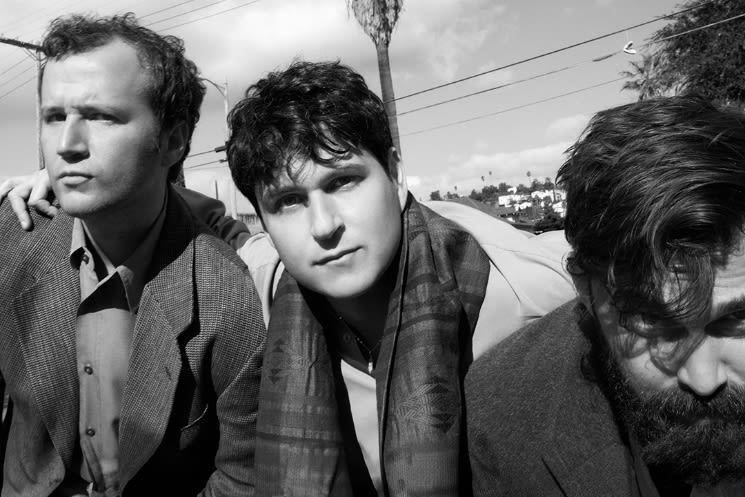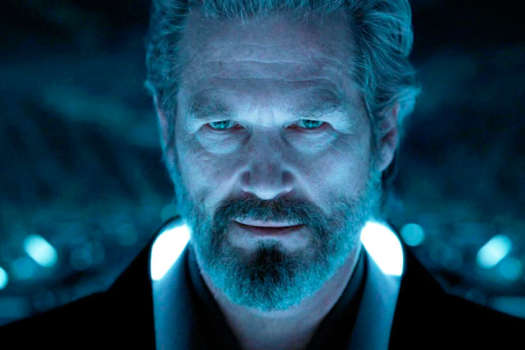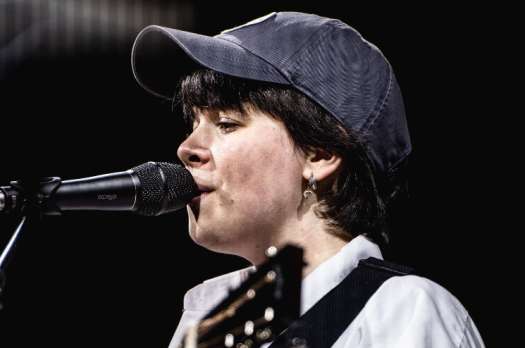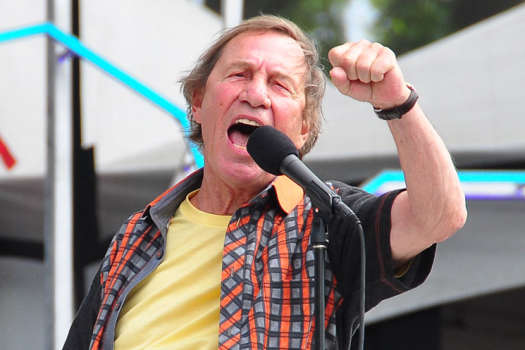For Ezra Koenig, Vampire Weekend haven't been gone that long. "The five years flew by," he says. "Five years doesn't feel long anymore. So, in that sense, it doesn't really feel like we've been away too long. But I'm very happy to have the album done. We got it exactly the way we wanted it to be."
Once considered the preeminent — and divisive — "college boy" upstarts from NYC, Vampire Weekend no longer feel the pressure of youth, or expectations. As Koenig says, "Getting older and making it to our fifth album, that just feels a little crazy to me, you know? Like, wow, five albums! That really feels like a long career to me."
And with their fifth album, Only God Was Above Us, the band have taken all they've learned and channeled it into a 45-minute opus of pain, mistakes, maturity and hope. The words are, at times, blunter, colder, more direct — but they are also funny, frank, and raw.
As Koenig admits, "Naturally, I got a little bit less interested in wordplay and 'smartass' stuff — which I've always loved — and a little more interested in the truly big questions. And you know, you're always interested in the big questions — children are interested in the big questions — but you enter your late 30s and you experience real life. You watch the older generation age, die; you watch the newer generation come in. The big questions take on a depth that they didn't quite have, at least for me, when I was younger. In a way these big questions — life and faith and death — they went from being primarily an intellectual concern, which is how I felt in my 20s, to something more real. People get sick, people die, you get older, you watch things come and you watch things go. I think all of those things naturally put one in a reflective mood and point you in a in a slightly different direction."
And that reflective mood has permeated the whole band — Koenig, drummer Chris Tomson, bassist Chris Baio, and a whole host of touring and guest musicians — who are preparing to go out on a massive tour in support of Only God Was Above Us, and who have been rehearsing together for their upcoming tour, a massive trek that kicks off on April 8 in Austin, TX, during the solar eclipse.
"We love playing during the day," Koenig says with an excited smile. "We love playing outside during the day, we love doing morning shows when we can. And it's funny because it feels meaningful in a lot of different ways. We were even talking with one of the promoters about the show, and he said, 'Wow, it's so cool that this is the week your album comes out and the eclipse feels so connected to your album.' And I remember thinking, Wait, how is the eclipse connected to the album? And he said, 'Because your album's called Only God Was Above Us and this cosmic event is happening above you.' And I was like, 'Damn, you're right.'"
Here, Koenig laughs at the absurdity of the situation and his inability to recognize the parallels. "I didn't even think about it! It's just nice the way things work out sometimes."
The rehearsals for these shows have given the band a chance to reconnect and re-examine, playing new songs while incorporating the old. "We've been rehearsing a lot lately," Koenig says, "just trying to figure out the new live show. And to hear all the songs from the first album, the last album, this album all together, and they feel right sitting next to each other; that's a great feeling. And it's really exciting to have all this music and have this catalogue that really feels like we've mapped out our world. I'm very proud of [our first album], it probably will always be our biggest album. [With] songs on it like 'A-Punk,' it's always going to loom very large. But I remember at the time thinking, 'This is a starting point. I can't wait to explore more aspects of who we are and just aspects of reality.' That's what I think a discography is. I think it's an artist's attempt to paint a picture of reality as they see it: personal, global, universal, but with every album, you have a chance to add another dimension to how you see reality."
This aforementioned discography — which includes four previous full-lengths, numerous singles, dozens of soundtrack and video game appearances, and covers that include Fleetwood Mac, Rancid, Springsteen and Robin Thicke — is undoubtedly one of the most celebrated and scrutinized in all of 21st century music, be it rock, indie, alternative or otherwise.
For each of their first three albums — the self-titled debut (2008), Contra (2010) and Modern Vampires of the City (2013) — the band worked as a tight four-piece: Koenig (vocals, guitars), Baio (bass), Tomson (drums), and Rostam Batmanglij (multi-instrumentalist and producer).
On their self-titled debut — which features some of the band's most beloved and recognizable songs, including the aforementioned indie anthem "A-Punk" — the band infused their jittery brand of indie rock with sounds of worldbeat and Afropop (elements some might say were appropriated). They were often scrutinized for their preppy look and unfairly categorized as WASPs, and were compared unfavourably to Paul Simon, particularly his Graceland period.
Nevertheless, the naysayers were silenced when the hype surrounding Vampire Weekend quickly catapulted them to Band of the Moment status: the internet was alight with buzz and praise, and they toured extensively and were featured on the cover of SPIN before they even released their first album. Not bad for a group of Upper Manhattan-educated punks.
On the follow-up, Contra, the band exceeded expectations by delivering a sophomore record that earned glowing reviews from many publications, including from us here at Exclaim!
The album recycled some of the sounds and influences from Vampire Weekend, but added a sense of scope and bombast, thanks largely to Batmanglij's burgeoning talent as a formidable producer and arranger. Ambitious tracks like the booming "Cousins," the frazzled "Giving Up the Gun" and the queer anthem "Diplomat's Son" showcased a band who were not only willing to experiment but also to share openly about themselves.
The album cover featured a polaroid from 1983 of a young, blonde woman wearing a yellow polo, once again reflecting the collegiate Cape Cod nostalgia of the first album. Unfortunately, not everyone was taken by the album's packaging, and the band was sued by Ann Kirsten Kennis, the model from the polaroid, for using her photo without permission. This led to a two-year legal battle, which also included the band filing their own lawsuit against the alleged photographer, Tod Brody.
Although the eclectic pop of Contra clearly alienated some fans (it sold half of what their debut did), the album nonetheless established the band as a bankable and formidable headlining act, and they were nominated for a Grammy for Best Alternative Music Album, losing to the Black Keys.
With their next two albums, the band would go on to win that very same Grammy, first with the dizzying baroque art pop of Modern Vampires of the City, and then with the warm, multi-genred experimentalism of Father of the Bride.
On Modern Vampires of the City, the band were joined by Ariel Rechtshaid, who co-produced the album with Batmanglij. The album — the band's most ambitious and mature record to date — received universal critical acclaim, was placed on numerous year- and decade-end best-of lists. The album explored existential themes of faith, loneliness and death, and its packaging reflected this darkened mood, its ornate lettering and smog-soaked cover image of Manhattan by Neal Boenzi reflecting the band's complex explorations of humanity's shadier side.
It would take six years for the band to release a follow-up, and in 2019 came the sprawling, collaboration-heavy Father of the Bride. But the Vampire Weekend that released that double album was very different from the one who had made those first three albums: on January 26, 2016, Batmanglij announced via Twitter that he was leaving the band as an official member, but that he would continue collaborating with Koenig on Vampire Weekend material. ("The Surfer," with its cruising-down-Ventura-Boulevard-stoned-with-the-Dust-Brothers-listening-to-trip-hop energy, is the only song on Only God Was Above Us that features Batmangilj, who helped compose and produce the track.)
In his absence, Rechtshaid took on a much more prominent role in the band, co-producing Father with Koenig and even co-writing some of the songs — a trend which Only God Was Above Us continues. "After making a big double album with lots of collaborators, it felt cool to do something more focused and with a smaller crew," Koenig acknowledges. "The vast majority of [Only God Was Above Us] was made with me and Ariel sitting in front of a computer, which is kind of how it always goes. We work together very closely."
Apart from some of the additional instrumentation — horns, saxophones, strings — Only God Was Above Us does sound like a much more intimate affair. Most importantly, the album sees the return from the two Chrises, Baio and Tompson, who were entirely absent from the making of Father of the Bride (which, for all intents and purposes, is essentially a Koenig solo album).
On Only God, they're back where they belong, playing their respective instruments, as well as producing, co-writing, and engineering. "I wanted Chris and Chris to also be a bigger part of it," Koenig says. "And there's the song 'Gen-X Cops,' which started as a demo CT [Chris Tompson] and I made years ago."
Although the band eschewed the large-scale collaborative approach of Father of the Bride, there are still Easter eggs throughout: "Dev Hynes from Blood Orange plays drums on 'Prep School Gangsters,'" Koenig says with a laugh, as if getting one of the most talented songwriters and instrumentalists of the 21st century to play drums on your new album is little more than an everyday occurrence. "He just happened to be in New York, and we were recording, and he played the drums with a broken arm." Casual.
For Koenig, every album is a chance to show the world a reflection of where he's at, where Vampire Weekend is at, and "where the world is at, to be a little more ambitious, to tell a cohesive story," he says. "That's the most interesting thing to me: how can we make something that feels like us, feels connected to the history of the band, but also reaches new territory. And that was a big obsession of mine for this album, because in a way it gets trickier with each album, because we've covered a lot of ground. So, to find something that still feels fresh to me and still feels like us is unique. I can come up with all sorts of crazy ideas, but they might not feel like Vampire Weekend. So, I'm looking for the crazy idea that does feel like Vampire Weekend, which sometimes feels like it's one in a thousand."
Even at 10 songs, Only God Was Above Us certainly feels ambitious: it's a sprawling, reflexive journey, and, at times, a tough one. Some of the lyrics are a lot to hear, and there are numerous moments that reflect and interpolate sounds and words from previous albums. On lead single "Capricorn," Koenig sings, "Too old for dying young / Too young to live alone," referencing the band's bouncy, punky first single from Modern Vampires, "Diane Young." After a very "Mansard Roof"-ian drum beat in the intro on "Connect," Koenig sings, "The memories don't fade / Surprising fate for days / You elegantly wasted / Before you lost your spark." It's a melancholic meta-reference, and a callback to their debut album.
Only God Was Above Us is full of moments, moods, and lyrics like these — simultaneously very beautiful and very sad. It's wistful but not entirely nostalgic, and even though it's filled with references and imagery, it's also direct and emotionally heavy.
Luckily, the past is never something that Vampire Weekend have shied away from, and those old songs — filled with references to Oxford commas, bus lines, lost loves, burning Saabs and crunk legends — still influence not only their setlists, but every aspect of creating, rehearsing, and performing. When I point this out to Koenig — that he really seems to care about his music and about his past, enough to play "A-Punk" twice at a show in Toronto in 2019 — he agrees that it's essential to reflect on the past, on the work you've put out, and the person you were.
"I can think of many things in my life that I cringe when I think about, like anybody, but the music is not one of them," he reflects. "We were playing 'The Kids Don't Stand a Chance' [from the self-titled debut] in rehearsal a little bit and even as we get distance from it, I can approach it more just as a listener. And I was really thinking, what is this song really about? You would think that I would have an answer ready to go, but I still think about it. I read the lyrics again for the first time in years. We play it. I hear all the parts, and I think about it like, right, there's something in 'The Kids Don't Stand a Chance' that weirdly almost presages some of what we're doing now. And I think, 'Where was that coming from?' There's something about 'The Kids Don't Stand a Chance" [that recognizes] that there are these powerful forces in the world that never stop and that sometimes you don't stand a chance against."
He continues, "And then I realized, 'Wow, this actually feels connected to "Hope," the final song on Only God Was Above Us.' It's something I've never thought about until here we are playing it. I love feeling that connection, and when we go back and play the old music and it still sounds good to me and I still feel connected to the words, I'm surprised, you know? It's cool."
At almost 8 minutes long, "Hope" is Vampire Weekend's longest song to date — an epic, optimistic, and hopeful (but not necessarily accepting) track filled with swirling piano lines, ironic lyrics and a giant fuzzed-out ending. The band sounds unsettled, resistant and hopeful, which feels very new for a Vampire Weekend song. And yet, Koenig believes that Vampire Weekend have always had a bit of a cynical edge.
"With Vampire Weekend," he says, "even in our happiest music, it's never been 'everything's great.' There's always been sadness and anxiety in the music. But, ultimately, I do think of that song 'Hope' as being intense but optimistic, which is a kind of a worldview that only comes with age. When I think of what the word 'hope' meant to me when I was young, [it meant] 'I hope things will go the way I think they should. I hope things will turn out in the way that I believe is right and good.' And when you get old, you've seen too many things and had too many experiences to fully buy into that naïve belief."
He reflects, "What does hope mean? Well, I hope I have the ability to let things go; I hope I have the ability to go with the flow of life; I hope I have the ability to love life, no matter what form it takes. People told me stuff like that when I was young. I'd complain about something, and people would say, 'Well, you know, everything happens for a reason, you can learn and take a good lesson [from this]' and I'd just be like, 'Oh my God, shut up!' I think everybody's like that. And then you get older, and you realize, you know, they're not kidding. Everything does happen for a reason, if you allow yourself to view the world that way."
By far one of Vampire Weekend's harshest records, Only God Was Above Us has been repeatedly described as "gritty" — even if some of that grit can be attributed to the accompanying visuals, which come courtesy of American artist Steven Siegel.
As Koenig explains it, "When I first came across [Siegel's] work, the images just really jumped out at me, and I think what I liked about them is the touch of surreality. We've all seen a million pictures of funky '80s New York — the devastation, the grit — and to see a picture I'd never quite seen before, playing with gravity, that really struck me. It also spoke to what we were trying to do with the album, which is to revisit an era I've always been very interested in, 20th century New York, but with the distance of time and through a more psychedelic lens. Seeing that image just really struck me: there was a touch of Beastie Boys in it, but also a touch of Pink Floyd and Hipgnosis in it. And that's really what drew me to it. And when I found out that those images were unedited, that they were just playing with the fact that the subway cars were overturned, I liked them 10 times more."
And with that visual grit came the need for noise, which is here and present all over: the free-jazzy break and outro in "Classical," the fuzz of "Ice Cream Piano" and "Gen-X Cops," the grinding sounds in the chorus of "Capricorn," the cascading outro of "Pravda," and the crunchy end of "Hope." You get the feeling that the band are revelling in the racket, adding abrasive sounds over some generally very pretty songs, and in the process creating some very impressive musical contradictions through this cathartic noise; a mischievous din delivered with a sense of winking glee.
When asked about this sonic abrasiveness, Koenig instantly reflects back on who Vampire Weekend were, and the expectations he placed on the band himself: "I have kind of laughed at myself thinking about the fact that we've always been classified as an indie band, or at times an alternative band. And I think there's a whole history of alternative music that is meaningful to me but was never quite a part of the Vampire Weekend world. So there's something kind of exciting about using stuff as basic, as you know, whammy pedals and distortion and feedback [for the first time]. When Vampire Weekend started, like everybody has to do when they're young, you have to define yourself a little bit in opposition to other things. So, I wrote a little manifesto when the band started where I said, 'No T-shirts on stage.' I liked the Strokes and Interpol and all those bands, but they were scuzzy. How about button-down shirts? And how about, instead of aggressive guitar tones, something really clean? And that felt fresh at the time. So all these years later, it's interesting to try to create a synthesis of both what we've been and what we pushed against. And I think of a song like 'Classical' and I think, right, I see the connection to our early stuff, but I also see the connection to music that I really kept at arm's length back then. But at the end of the day, I'm a child of the '90s. Guided by Voices, [for example]. That's in my orbit. It's in my world. I've always had an affection for that kind of music, too."
As a musician, one should always be evolving — as a person, as a composer, as a writer, and as someone who wants to share their thoughts in different ways. While the influences on Only God Was Above Us are wide-ranging and idiosyncratic, it's also up to the artist themselves to take all those influences and turn them into something unique. Koenig readily acknowledges this necessity for change, whether it's brought about internally or externally: "I've always been looking for not only new territory for the band that feels exciting, but we're also always looking for ways to do what we do [in ways] that we find to be dignified. The music industry is always changing. There's always different approaches you can take — should you be posting 20 times a day on TikTok, just hoping that you hit the algorithm correctly? Maybe that might be your path, but sometimes, you got to really be quiet and listen: what's the path that's right for us? That stuff can be confusing. Yeah, you gotta go out there sometimes, but the one thing I've always known with the records, and what I've admired in other people, is when you can find a record for every emotion you might be feeling, and every moment in your life."
After discussing the merits of '80s Bob Dylan — the much-maligned period when he released albums filled with Christian themes, Mark Knopfler collaborations, and numerous stylistic and musical detours — Koenig gets contemplative. He's talking about Dylan ("Maybe because I'm about to turn 40, I'm interested in what Bob Dylan was doing when he was 40. I'm interested in how he was feeling. I'm interested in how he pursued his career."), but then very quickly, he's talking about himself and his own complex legacy.
"All any of us can hope for is that, as artists, can we make a work that reflects? Being young and excited, growing older, being old. I don't know how many records we'll make. But if I can be so lucky to make a remotely meaningful record in my 60s or so, I think that's as good as it gets. That's a true artist."
When I tell him that I think he's made some pretty meaningful records already, he laughs and answers simply, but pragmatically.
"So far, so good."
Guess we'll just have to wait 20 more years to find out.




